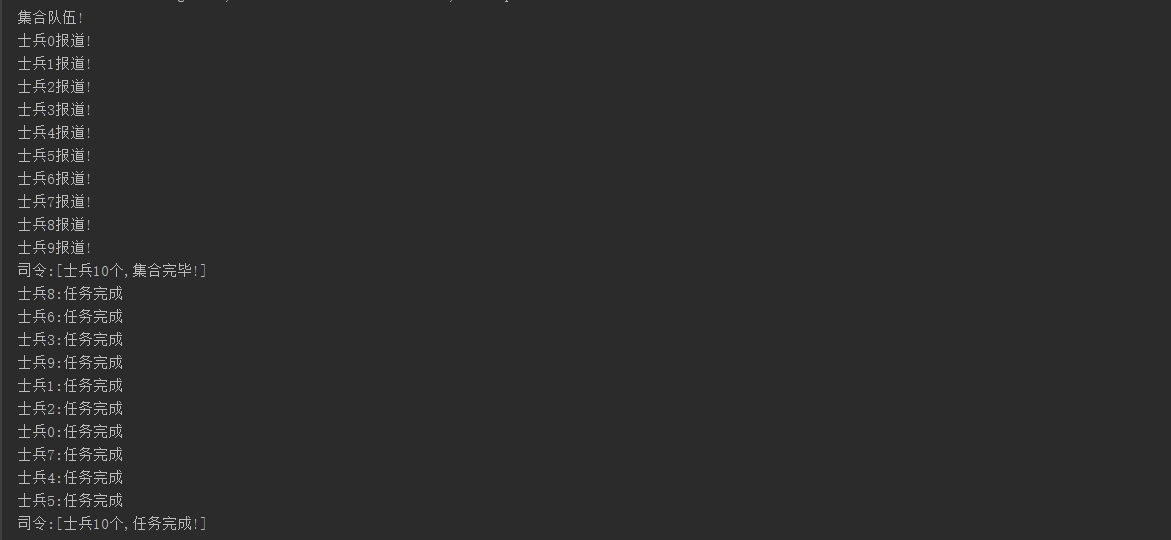可以理解为循环栅栏,栅栏就是一种障碍物.假如我们将计数器设置为10,那么凑齐第一批10个线程后,计数器就会归零,然后接着凑齐下一批10个线程,这就是循环栅栏的含义.
构造器:
public CyclicBarrier(int parties, Runnable barrierAction)
parties:计数总数,也就是参与的线程总数. barrierAction 当计数器一次完成计数后,系统会执行的动作
下面代码展示了 司令要求10个士兵去完成任务,先集合10个然后去一起完成任务,等全部完成后 司令才会宣布任务完成!
public class CyclicBarrierDemo { public static class Soldier implements Runnable { private String soldier; private final CyclicBarrier cyclic; public Soldier(CyclicBarrier cyclic, String soldier) { this.soldier = soldier; this.cyclic = cyclic; } /** * When an object implementing interface <code>Runnable</code> is used * to create a thread, starting the thread causes the object's * <code>run</code> method to be called in that separately executing * thread. * <p> * The general contract of the method <code>run</code> is that it may * take any action whatsoever. * * @see Thread#run() */ @Override public void run() { try { //等待所有士兵到齐 cyclic.await(); doWork(); //等待所有士兵完成工作 cyclic.await(); } catch (InterruptedException e) {//在等待过程中,线程被中断 e.printStackTrace(); } catch (BrokenBarrierException e) {//表示当前CyclicBarrier已经损坏.系统无法等到所有线程到齐了. e.printStackTrace(); } } void doWork() { try { Thread.sleep(Math.abs(new Random().nextInt() % 10000)); } catch (InterruptedException e) { e.printStackTrace(); } System.out.println(soldier + ":任务完成"); } } public static class BarrierRun implements Runnable { boolean flag; int N; public BarrierRun(boolean flag, int N) { this.flag = flag; this.N = N; } /** * When an object implementing interface <code>Runnable</code> is used * to create a thread, starting the thread causes the object's * <code>run</code> method to be called in that separately executing * thread. * <p> * The general contract of the method <code>run</code> is that it may * take any action whatsoever. * * @see Thread#run() */ @Override public void run() { if (flag) { System.out.println("司令:[士兵" + N + "个,任务完成!]"); } else { System.out.println("司令:[士兵" + N + "个,集合完毕!]"); flag = true; } } } public static void main(String[] args) { final int N = 10; Thread[] allSoldier = new Thread[N]; boolean flag = false; CyclicBarrier cyclic = new CyclicBarrier(N, new BarrierRun(flag, N)); //设置屏障点,主要为了执行这个方法 System.out.println("集合队伍! "); for (int i = 0; i < N; i++) { System.out.println("士兵" + i + "报道! "); allSoldier[i] = new Thread(new Soldier(cyclic, "士兵" + i)); allSoldier[i].start(); } } }
结果:
